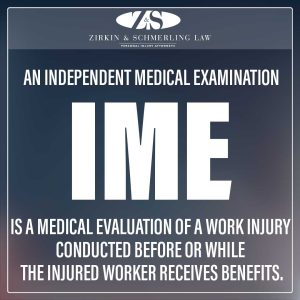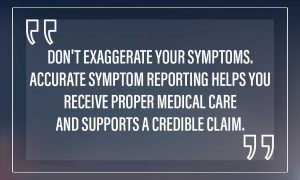
Your workers’ compensation doctor plays a large part in determining the outcome of your injured workers’ compensation claim.
Your worker’s comp doctor will decide your medical treatment plan, work restrictions, and how the injury will affect your life in the years to come. Because their opinion is so important, you must be sure they have all the correct information necessary to form an accurate opinion.
This is why an injured worker should work hard not to say the wrong thing to the treating physician in workers’ compensation cases. In this blog, we discuss some crucial things not to say to your workers’ compensation doctor or insurance company while seeking compensation after a workplace injury or severe workplace accident.
What Is a Workers’ Comp Independent Medical Exam (IME)?

An independent medical examination (IME) is a medical evaluation of a work injury conducted before or while the injured worker receives benefits. The IME involves an assessment by a third-party doctor to determine the extent of a claimed work-related injury, illness, past injury, or resulting disability.
Independent Medical Exams may include blood work, a physical examination by your worker’s compensation doctor, diagnostic imaging, reviewing your history for any medical condition that may impact this incident, and identifying any pre-existing conditions (like a previous injury).
IMEs are typically requested by employers or their workers’ compensation insurers, mainly when an injury occurs and there is disagreement with the treating physician.
Refusal to undergo an IME with your workers’ compensation doctor can lead to the denial of workers’ compensation benefits.
How an Independent Medical Exam Impacts Your Workers’ Comp Claim
Essentially, the IME assesses your functional limitations to determine how your injury has impacted your ability to perform your job.
Pain level, range of motion, any related old injury in your medical history, and how the current injury has affected your life are all things the doctor will consider when performing this exam.
Once they have formed an opinion, they will determine the extent of the injury, whether you need additional medical treatment, and what caused the injury.
A workers’ compensation insurance company may request an IME at any point., It’s essential to be honest and accurate when describing your injuries and pain while not exaggerating your symptoms. The physician will provide a medical opinion to your employer’s insurance company after the examination. It’s important to note that the physician will also assess for any indications of intentional symptom exaggeration, which may be considered workers’ compensation fraud.
Avoiding any misrepresentation of symptoms to your doctor is crucial to protect the integrity of your claim.
Does a Workers’ Comp Doctor Work For Me?
While workers’ comp physicians aim to assist you, it’s essential to recognize that the insurance company retains workers’ comp doctors. Their assessments may be influenced by the insurance company and their desire to pay as little as possible in compensation benefits.
Injured workers must be very careful about what they say to a workers comp treating physician during the examination. To protect your legal rights, work with an experienced workers’ compensation lawyer who will prioritize your interests, not an insurance company trying to turn a profit. In addition, your workers’ compensation lawyer can also help set you up for medical treatment to make sure you get the best treatment possible to help you receive a positive outcome.
Contact Zirkin & Schmerling at (410) 753-4611 for a free case evaluation so we can ensure that your rights are protected throughout the claim process.
What Not to Say to a Workers’ Comp Doctor
Since the workers’ compensation doctor and the report they create are essential in determining the outcome of your workers’ compensation case, what you say and how you say it can lead to workers’ comp claim denial.
Be Honest About How You’re Feeling

Don’t exaggerate your symptoms. Accurate symptom reporting helps you receive proper medical care and supports a credible claim. Doctors know how to spot exaggerated claims and will document them.
Don’t minimize your symptoms or pain level. Downplaying symptoms can lead to inadequate treatment and may harm the credibility of your claim.
Don’t make jokes or sarcastic remarks about your workplace injury or the examination process. If you speak badly about the doctor or your company, it can negatively affect the examiner’s assessment. It’s okay to have negative feelings, but they aren’t something you want to say to a workers’ comp doctor or insurance company.
Be Honest About Your Incident, Work Situation, and Health
Don’t fabricate details about how your work injury occurred. Providing false information damages trust and jeopardizes your claim’s validity. Where, when, and how the work accident happened is foundational to your case.
Don’t withhold information from the treating doctor about an old injury or your medical conditions. Full disclosure is essential for the IME doctor to accurately assess your situation and provide appropriate treatment.
Don’t lie about your employment status, training, or job responsibilities. Be completely honest with the treating doctor so you don’t lose credibility. Misrepresenting your work situation can impact the validity of your claim and legal proceedings.
Behave Professionally and Respectfully
Don’t use offensive language or inappropriate gestures. Maintaining professionalism fosters a respectful examination environment. Your workers comp physician is unlikely to be sympathetic if you are rude.
Don’t express distrust or skepticism towards the treating doctor conducting the examination. Trusting the examiner’s expertise is crucial for a fair evaluation of your condition.
Don’t make unfounded accusations against your employer or colleagues regarding the on-the-job injury. Baseless accusations can damage professional relationships and hinder the workers’ compensation claim resolution.
Be Transparent and Cooperate
Don’t refuse access to medical records related to your current injury or past injuries that may impact this situation. Access to medical records helps the examiner understand the full context of your injury and medical history.
Don’t refuse to sign consent forms or release documents required for the examination process. Signing necessary documents facilitates the examination and ensures compliance with legal procedures.
Don’t refuse to cooperate with the examiner’s inquiries or assessments. An accurate evaluation of your condition leads to better medical care. The doctor needs to have a clear picture of the injured worker so they can order treatment like medication, physical therapy, light-duty work restrictions, or even surgery.
Prioritize Health and Safety
Don’t engage in activities that contradict your reported limitations. Adhering to recommended limitations is crucial for preventing further injury or complications.
Don’t engage in activities that could aggravate prior injuries during the examination. Avoiding aggravating activities helps ensure an accurate assessment and minimizes discomfort.
Don’t show up to the appointment intoxicated. Substance use can impair judgment and may impact the validity of the examination results. It will also be documented in your medical record, which the insurance company will review.
Honor Ethical and Legal Boundaries
Don’t discuss your legal strategy or intentions regarding the workers’ compensation claim. Keep legal discussions separate from medical examinations because the insurance company sees all the notes from the workers’ comp doctor.
Don’t attempt to manipulate the results of physical tests or assessments. Manipulating tests compromises the integrity of the examination process and undermines trust.
Don’t attempt to bribe or influence the examiner. Offering bribes is unethical and could lead to legal consequences.
Don’t take unauthorized recordings or photographs during the examination. Recording without permission violates privacy and confidentiality protocols.
What If I Already Said Something To the Workers’ Compensation Doctor That I Shouldn’t Have?
- Contact Your Workers’ Comp Attorneys: If you’ve already said or done something inappropriate during a workers’ compensation medical exam, the first step is to seek guidance from your attorney immediately.
Your workers’ compensation attorney will help you address the situation without making things worse and potentially invalidating your claim. - Clarify Misunderstandings: Your lawyer can assist you in addressing any misunderstandings or misinterpretations of your actions or statements during the examination. They can provide guidance on how to explain things to the examiner.
- Follow Advice From Experienced Attorneys: Trust your attorney to help avoid potential repercussions and protect your legal rights wherever possible.
- Acknowledge the Mistake: Take a moment to recognize and accept that you may have behaved inappropriately during the examination. Your attorney can help you create statements acknowledging the issue and apologizing when needed.
- Focus on Moving Forward: Emphasize your commitment to cooperating fully with the examination process under the guidance of your legal counsel. Your lawyer will ensure your rights are protected and you navigate the process effectively.
Can I Get a Second Opinion For a Workers’ Compensation Claim?

Securing a second opinion in workers’ compensation cases is subject to varying state regulations, including who bears the cost. Unfortunately, in most workers comp cases, the insurer is not obligated to approve the treatment recommended by the second physician.
If your injury isn’t what the primary physician treats typically, they will refer you to one or more specialists. If you disagree with the specialist, you can also request another exam, but there are rules.
If disagreements arise with a medical provider or new doctor down the referral chain, individuals are often required to return to the initially chosen physician to get a new referral.
It’s a time-consuming process that can be exhausting and impede your ability to get the treatment and financial compensation you deserve.
Navigating these nuances can be challenging, especially when the employer’s insurance company works hard to minimize costs.
Navigating this system is risky without a workers’ compensation attorney familiar with local laws, medical providers, and insurance company practices.
Initial consultations with an experienced workers’ comp attorney are free and non-binding, they offer invaluable insights into the legal landscape and potential pitfalls of your workers comp case. Call Zirkin & Schmerling today at (410) 753-4611.
Can I Change My Workers’ Compensation Doctor If I Don’t Like Them?
Similar to seeking a second opinion, the ability to change physicians during workers’ compensation depends on the specific regulations of workers’ compensation law in the jurisdictional state.

However, selecting a workers’ comp doctor who’s not authorized may mean you have to pay the medical expenses instead of the insurance company.
Given the complexities involved, seeking legal guidance from a knowledgeable attorney is highly advisable. Attorneys experienced in workers’ compensation matters can help individuals navigate the intricacies of working with a workers’ comp doctor.
An experienced attorney can also connect you with a reputable workers’ compensation doctor familiar with the workers’ compensation system if you need one.
Consulting with an attorney early in the process can help workers make informed decisions and protect their rights throughout the claims process. Contact Zirkin & Schmerling at (410) 753-4611 for a free case evaluation so we can ensure that your rights are protected throughout the claim process.
You Deserve a Workers’ Comp Attorney That Will Fight For Fair Compensation
Overcoming workers’ compensation case hurdles is complicated. Don’t try to navigate appointments with your workers’ compensation doctor alone.
Zirkin and Schmerling’s Maryland personal injury lawyers prioritize our clients and make sure they understand the steps in the legal process. We pride ourselves on working closely with our clients to ensure they receive the compensation they deserve in workers’ compensation cases. Contact us at (410) 753-4611 to set up a free consultation with one of our experienced accident lawyers today.
